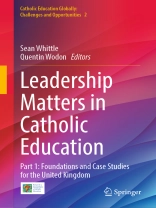This edited collection is the first part of a two-volume set., which focuses on leadership in Catholic education settings in the United Kingdom. It includes an overview of the importance of different types of leadership, including ‘servant-leadership’, in understanding and framing Catholic school practice, a critical survey of why leadership matters to ensuring the success of Catholic education, and a discussion of what counts as the defining characteristics of leadership in Catholic education and how this relates to the aims or philosophy of Catholic education. The chapters in this book draw from the insights and experiences of serving Catholic school leaders as well as from academics and researchers in Catholic education studies. The final two chapters provide a comparative analysis for the United Kingdom in a global perspective using data from the Organisation for Economic Co-operation and Development (OECD) . Together, the chapters argue that there is an urgent need to find, nurture, and sustain outstanding leaders for Catholic schools and colleges.
Tabella dei contenuti
Introduction: Leadership in Catholic school.- Leadership Ideals for the 21
st Century: Servant and Christ-Centred Leadership
.- Contemporary Catholic Leaders and Teachers Responding to Challenging Times.- Servant Leadership in Catholic schools: ‘whoever wants to become great among you must be your servant’.- Time to ‘reclaim’ the notion of servant leadership.- Dynamic Fidelity: exploring ‘Spiritual Capital’ in Catholic Independent Schools.- A Cloister in the World: an exploration of emerging visions of leadership in contemporary Benedictine school chaplaincy.- Welcoming bricolaging believers and occasional belongers: an empirical study of families in church schools.- Recruiting Catholic headteachers.- Pivotal to the Future of Catholic Primary Schools: Non-Catholic Teachers.- School Eldership: learning from experiential wisdom of the elders in shaping a new vision for leading Catholic schools.- Inscribed in the Very Heart of their Identity: Recruitment, Retention and Formation of faith leaders in Catholic primary are schools in Scotland.- Implementing a Vision for Christian Education Ethos: the experiences of school leaders in two schools and implications for practice.- The extent to which Catholic Education affects and influences the formation of Women Leaders in the Philippines.
Circa l’autore
Sean Whittle[1] is a Senior Lecturer in Catholic Education at St Mary’s University, London, and a member of the Centre for Catholic Education, Research, and Religious Literacy. He is also a Research Associate working with Professor Gerald Grace (founding and former Director of the Centre for Research and Development in Catholic Education). Alongside these academic roles he works part-time as a secondary school RE teacher at Gumley House FCJ Catholic School in West London. His book, A Theory of Catholic Education (Bloomsbury 2014), presents a robust philosophy of Catholic education that draws fruitfully on insights from Karl Rahner. He has edited six books on Catholic Education (Vatican II and New Thinking about Catholic Education 2016[Routledge]; Researching Catholic Education 2018 [Springer]; Religious Education in Catholic schools in the UK and Ireland 2018 [Peter Lang]; Irish and British Perspectives on Catholic Education 2021 [Springer], New Thinking, New Scholarship and New Research in Catholic Education: Responses to the Work of Professor Gerald Grace 2021 [Routledge]). Also in 2021 he jointly edited with Dr Gareth Byrne Catholic Education: A lifelong journey [Veritas]. For a number of years he has been collaborating with other academics working in the field of Catholic Education Studies, serving as the secretary for the Network for Researchers in Catholic Education (Nf RCE). He has also been engaged in a range of research projects (including a Post-Doctoral Research Fellow at Brunel University on a Religious Literacy project, Researching RSE in Catholic schools in Northern Ireland, and a research project of a Catholic Multi-Academy Trust in Birmingham). Sean serves as chair of the academic association AULRE.
Quentin Wodon works for an international development agency. Previously, he worked at the World Bank, including as Lead Economist, Lead Poverty Specialist, and manager of the unit on values and development. Before that, he taught with tenure at the University of Namur (Belgium). He has also taught at Addis Ababa University (Ethiopia), American University (USA), and Georgetown University (USA). A business engineering graduate, after an assignment in Asia as Laureate of a Prize, he worked in brand management for Procter & Gamble. He then shifted career to join a non-profit working with the extreme poor. This led him to pursue a career in international development. Quentin holds four Ph Ds, has over 700 publications, and has worked on policy issues across sectors in more than 60 countries. As part of his volunteer work, he has held multiple leadership positions with non-profits. His research has been covered by leading news media globally.












